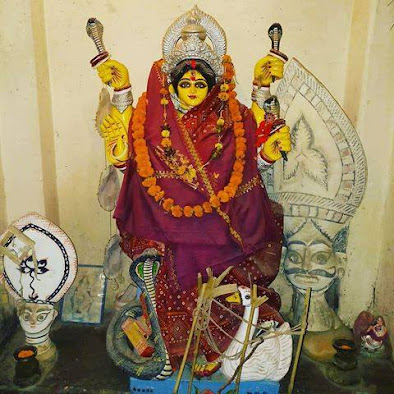জ্যোতির্লিঙ্গ উপাক্ষানে কি হরির সম্মান কমেছিলো?
ব্রহ্মোবাচ।
বাক্ সঙ্গমমিতি খ্যাতং যত্র বাগীশ্বরো হর:।
তত্তীর্থং সর্ব্বপাপানাং মোচনং সর্ব্বকামদম্।।১
তত্র স্নানেন দানেন ব্রহ্মহত্যাদিনাশনম্।।১
ব্রহ্মবিঞ্চ্বোশ্চ সংবাদে মহত্ত্বে চ পরম্পরম্।
তয়োর্মধ্যে মহাদেবো জ্যেতির্মূর্ত্তিরভূৎ কিল।।
তত্রৈব বাগুবাচেদং দৈবী পুত্র তয়ো শুভা।
অহমস্মি মহাংস্তত্র অহমস্মীতি বৈ মিথ:।।৩
দৈবীং বাক্ তাবুভৌ প্রাহ যস্তৃস্যান্তনত্ত পশ্যতি।
স তু জ্যেষ্ঠো ভবেত্তস্মান্মা বাদং কর্ত্তুমর্হথ:।।৪
তদ্বাক্যাদ্বিষ্ণুরগমদধোহহং চোর্দ্ধমেব চ।
ততো বিষ্ণু: শীঘ্রমেত্য জ্যোতি:পার্শ্ব উপাবিশৎ
অপ্রাপ্যান্তমহং প্রায়াং দুরার্দ্দূরতং মুনে।
তত: শ্রান্তো নিবৃত্তোহহং দ্রষ্টুমীশং তু তং প্রভুম্।।৬
তদৈবং মম ধীরাসীদ্দৃষ্টশ্চান্তো ময়া ভৃশম্।
অস্য দেবস্য তদ্বিষ্ণোর্মম জৈষ্ঠ্যং স্ফুটং ভবেৎ
পুনশ্চাপ মম ত্বেবং মতিরাসীন্মহামতে।
সত্যৈর্বক্তৈ: কথং বক্ষ্যে পীড়িতোহপ্য নৃত্ং।।
বচ:।।৮
নানাবিধেষু পাপেষু নানৃতাৎ পাতকং পরম্।
সত্যৈর্বক্তৈরসত্যাং বা বাচং বক্ষ্যে কথং ত্বিতি
ততোহহং পঞ্চমং বক্ত্রং গর্দ্দভাকৃতিভীষণম্।
কৃত্বা তেনানৃতং বক্ষ্য ইতি ধ্যাত্বা চিরং তদা।
অব্রবং তং হরিং তত্র আসীনং জগতাং প্রভুম্।
অস্য চান্তো ময়া দৃষ্টস্তেন জৈষ্ঠ্যং জনার্দ্দন।।১১
মমেতি বদত: পার্শ্বে উভৌ তৌ হরিশঙ্করৌ।
একরুপত্বমাপন্নৌ সূর্য্যাচন্দ্রমসাবিব।।১২
তৌ দৃষ্ট্বা বিষ্মিতো ভীতশ্চাম্ভবং তাবুভাবপি
তত: ক্রুদ্ধৌ জগন্নাথৌ বাচং তামিদমূচতু:।।১৩
হরিহরাবূচতু:।
দুষ্টে ত্বং নিম্নগা ভূয়া নানৃতাদস্তি পাতকম্।।১৪
তত: সা বিহ্বলা ভূত্বা নদীভাবমুপাগতা।
তদ্দৃষ্ঠ্বা বিষ্মিতো ভীতস্তামব্রবমহং তদা।।১৫
অনুবাদ: ব্রহ্মা কহিলেন, বাক্ সঙ্গম নামে বিখ্যাত তীর্থ আছে, ঐ স্থানে বাগীশ্বর হর বিরাজমান। ঐ তীর্থ সর্ব্বপাপ-মোচন ও সর্ব্বকামপ্রদ। সেখানে স্নানে দানে ব্রহ্মহত্যাদি পাপও বিনষ্ট হয়।একদা ব্রহ্মা ও বিষ্ণুর মধ্যে মহত্ব লইয়া বিবাদ সংঘটন হইলে, তাঁহাদিগের মধ্যভাগে মহাদেব জ্যোতির্ময় মূর্তিতে আবির্ভূত হইলেন। পুত্র নারদ! তাহাদিগের সেই বিবাদভঞ্জন জন্য এই দৈববাণী হইলো যে, যে এই জ্যোতির্ময় শিবের অন্তদর্শন করিবে, সেই শ্রেষ্ঠ বলিয়া পরিগণিত হইবে। সুতরাং তোমরা বিবাদ করিও না। সেই দৈববাণী শ্রবণে বিষ্ণু অধোভাগে ও আমি উর্দ্ধদিকে প্রস্থান করিলাম। পরে বিষ্ণু সত্বর ফিরিয়া আসিয়া সেই জ্যোতির্ময়ের পার্শ্বে উপবিষ্ঠ হইলেন। আমি কিন্তু তাহার অন্ত না পাইয়া দুর দুরান্তে যাইলাম। হে মুনে! তারপর আমি (উহার অন্ত না পাইয়া) ভ্রান্ত হইয়া সেই প্রভু ঈশানের দর্শনকার্য্য হইতে নিবৃত্ত হইয়া আসিলাম। তখন আমার সেই দৃঢ় বুদ্ধি হইলো যে, ( আমি বিষ্ণু অপেক্ষা অনেক পরে প্রত্যাগত হইয়াছি বলিয়া) আমি দেবের অন্ত দর্শন করিয়াছি। সুতরাং বিষ্ণু অপেক্ষা আমার শ্রেষ্ঠ্যত্ব প্রতিপালিত হইবে। কিন্তু আমার আবার ইহাও মনে ৈউঠিল যে, পীড়িত হইলেও চিরসত্য মুখ দ্বারা মিথ্যা কথাই বা কিভাবে বলিব? এই রুপ চিন্তাতে ‘‘আমি ভীষন গর্দ্দভাকৃতি আর একটি মুখ সৃষ্টি করিয়া মিথ্যা কথা বলিব।” এইরুপ স্থির করিয়া সেই স্থানে সমাসীন জগৎপ্রভু হরিকে কহিলাম- হে জনার্দ্দন! অমি ইহার অন্ত দর্শন করিয়াছি; অতএব আমার শ্রেষ্ঠ্যতা হইল! আমি এই কথা কহিতেছি, ইতিমধ্যে পার্শ্বস্থ হরি ও সেই শঙ্কর উভয়ে(অমাবস্যাতে) চন্দ্রসূর্য্যের ন্যায় এক রিুপতা প্রাপ্তা হইলেন। আমি তখন তাহাদিগের একরুপতা দেখিয়া বিস্মিত ও ভীত হইয়া স্তব করিলাম। পরে জগন্নাথদ্বয় ক্রুদ্ধ হইয়া সেই বাণীকে এই কথা কহিলেন, ‘‘ রে দুষ্ঠে! অনৃত অপেক্ষা পাতক নাই। অতএব তুই নিম্নগা হইবি। তারপর বাণী বিহ্বলা হইয়া নদীভাব লাভ করিলেন।








